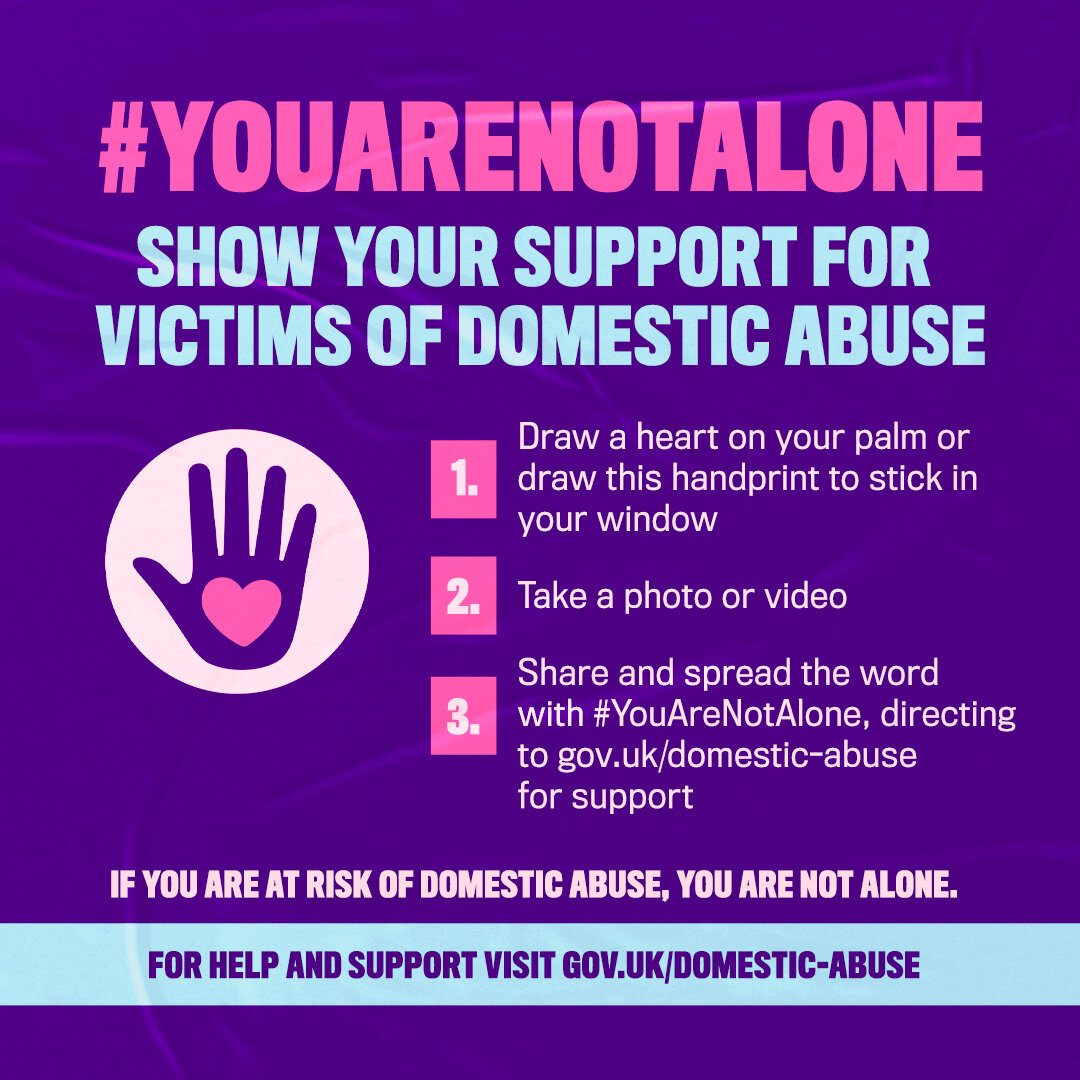#YouAreNotAlone - When Home Isn't Safe
Throughout the Covid-19 pandemic, we have been told unequivocally to “stay home” for our own safety and for the safety of others. But for those suffering from domestic abuse, home isn’t the safe sanctuary it should be. For victims of violence, home becomes an all-too-often deadly prison.
Wednesday 25th November is International Day for the Elimination of Violence against Women. A Femicide Consensus just published looking at the epidemic of male violence against women over the last decade has found one woman is killed by a man every three days in the UK, on average. Three women a week. Let that sink in. Lockdown saw domestic abuse killings more than double. 16 women and children died in the first three weeks alone in March this year, and we are still living under lockdown restrictions and heading into winter; in short, we are more likely to spend more time at home.
As Karen Ingala Smith so pertinently said, it is time to recognise that men’s violence against women and girls will not be eradicated without fundamentally addressing sex inequality and the beliefs, attitudes and institutions that underpin it.
I am painfully aware of how devastating domestic violence is after escaping an abusive relationship in March, 2019. I suffered severe PTSD for months. I also know now that there is life after trauma. And that life is beautiful and full of light and hope. The first step is having the courage to leave. You are not alone and you will be believed. Being forced into a national lockdown with an abusive partner would be unbearable. Yet there are many living in fear and danger right now. There is a way out.
There is lots of advice below. Please, reach out for help and support. You will be believed and you are not alone. And if you are reading this, in a warm, safe, loving home, please consider sharing this and supporting those who need it most.
Domestic abuse is the single most harmful crime type with 2.4m victims each year, but fewer than one in five of domestic abuse victims report their abuse to the police.
Home is not always the safe haven it should be. Help and support remains available for victims of domestic abuse who may be cut off from their normal lifelines and support at this time.
All forms of domestic abuse are not acceptable in any situation.
Covid 19 household restrictions do not apply to people that are at risk of, or are experiencing, domestic abuse. They are still able to leave their homes and seek refuge.
Police will respond to your calls and support services remain available.
People who might be experiencing domestic abuse should call 999 if they are in immediate danger and ask for the police. To speak to the police when it’s not an emergency call 101.
If someone is unable to call because of hearing and speech impairments, they can use the emergency text service if they register in advance by texting REGISTER to 999. This will send a text which tells you what to do next. Once registered you can text 999 in an emergency.
If they are in danger and unable to talk, they should listen and respond to the operator’s questions by coughing or tapping the headset, if possible.
On a mobile, the caller can use the silent solution system by pressing 55 when prompted by the operator to transfer the call to the police without having to speak.
On a landline, the operator will automatically connect to the police if they are unable to establish if an emergency service is needed.
Lots of further help and information on how to seek support is available at gov.uk/domestic-abuse
Women who may be experiencing abuse, or those concerned about people, can call the National Domestic Abuse Helpline (England only) on 0800 2000 247. Text relay and translation service available.
Women in Wales can call the Live Fear Free helpline on 0808 80 10 800 or text 07860077333.
The Men’s Advice Line is a confidential helpline for male victims of domestic abuse and those supporting them. It can be contacted on 0808 801 0327. Text relay and translation service available.
People who may be worried that their own behaviour may be hurting others can get support and advice at the Respect Phoneline on 0808 8024040. Text relay and translation service available.
The NSPCC Helpline is available for anyone with concerns about a child to contact for professional advice and support on 0808 800 5000 or email help@nspcc.org.uk.
If you are a member of the LGBT+ community, Galop runs a specialist helpline on 0800 999 5428 or email help@galop.org.uk.
Karma Nirvana is a national helpline for victims of honour-based abuse, forced marriage and domestic abuse: Phone: 0800 5999 247, email support@karmanirvana.org.uk or send a secure message via the website
Victims with disabilities can contact Stay Safe East who offer advocacy and support services to disabled victims and survivors of abuse. Phone 0208 519 7241, Text: 07587 134 122 or email enquiries@staysafe-east.org.uk
SignHealth offers domestic abuse support for deaf people in British Sign Language (BSL). Phone: 020 3947 2601, Text, WhatsApp, Facetime: 07970 350366 or email da@signhealth.org.uk
